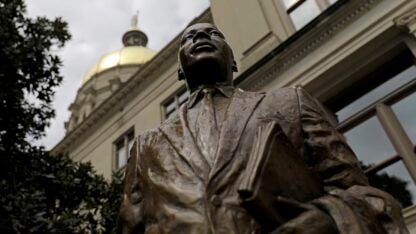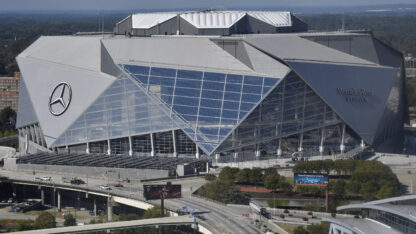WABE sent questions about environmental issues to all of the mayoral candidates. The questions cover climate change and extreme heat, water resources, park maintenance, the tree ordinance and lead contamination in West Atlanta neighborhoods.
The questions are in bold, and Rebecca King‘s answers follow.
Read answers from other candidates.
The U.S. Environmental Protection Agency recently expanded the area in English Avenue and Vine City where properties may need to have their soil completely removed and replaced, after finding dangerous levels of lead in people’s yards.
What role do you think the City of Atlanta should have in engaging with the community, and what is your plan to address this potential children’s health issue in West Atlanta neighborhoods?
The role of the City of Atlanta should be a hub of information and services to assist residents in mitigating their property safely of the lead. With the hub in place in my administration, I will follow up with the EPA and the land owners to be certain that all lead is mitigated. Lead cannot be allowed to permeate the soil for future generations.
While Atlanta has some big, beautiful new parks opening now and coming soon, many city parks need maintenance. According to the Park Department’s long-term planning program, Atlantans said the number one thing discouraging them from using their parks was that they were not well maintained.
How would you ensure that parks — whether they’re new or old, big or small, regardless of the neighborhood — get adequate funding and maintenance? And how would you involve communities in decisions about their parks?
My administration would require an audit of all parks’ infrastructure and the necessary maintenance so that all parks are inviting no matter what park you are enjoying. Parks that are “left behind” should be a top priority with the City of Atlanta. By gathering businesses, foundations and neighborhoods, I will bring those parks up to standards that will represent the best of Atlanta. With those audits of the parks similar to a reserve study for buildings, the budget of the City of Atlanta will reflect a path forward that maintains the parks and brings together residents that showcase the gem of their neighborhood.
Atlanta is losing its tree canopy, and the city has taken years to finish a promised re-write of the tree protection ordinance.
How would you make sure the ordinance update is completed, and ensure that it is enforced?
As a mayoral candidate, I would ask that the current city council complete their service with completion of the tree ordinance. As mayor I will task my administration to inform land owners and developers of the benefits of maintaining a bountiful canopy of trees. There are many economic benefits to the tree canopy. Trees can act to offset a lack of impervious surface due to their leaves. Increasing rain absorption could lessen property damage from flooding. Trees cool an area and can help a home or building become energy efficient.
Atlanta is hot and getting hotter. Often the hottest neighborhoods are in vulnerable communities of color. Atlanta also has many households with high energy burdens that pay a high proportion of their income to energy bills. Not everyone can afford to run the air conditioner all summer or afford efficiency upgrades to keep their homes cooler — and heat can be dangerous.
What role do you see for the mayor’s office in addressing the health risks of extreme heat?
An article in Science Daily validates the benefits of a tree canopy from energy savings to lessening “heat islands.” Encouraging trees as part of development and part of the Comprehensive Development Plan would show that my administration values trees and recognizes their necessity. The tree recompense could be utilized to set aside a portion of trees for vulnerable communities. My administration will pull together Invest Atlanta, commercial entities and non-profits to provide financial tools that will assist residents in tackling those efficiency upgrades. The return on investment would be actualized in fewer first responder visits and hospital visits. Any financial interests that were not actualized could be actualized after the sale of the home.
To address climate change, the City of Atlanta prepared a climate action plan in 2015 on how to cut emissions. The city also made a commitment to achieve 100% clean energy by 2035. But progress towards that goal has been slow.
What, if anything, would you do to keep Atlanta moving towards emissions reductions? And how would you prepare Atlanta communities to weather the effects of climate change, which include extreme heat, increased flooding, mosquito-borne disease and worsening air quality?
Encouraging public transportation and walking or rolling would bring benefits to the individual as well as to the sustainability of our city. I will lead by example showing that the City of Atlanta is committed to being the best steward of our environment.
Georgia won a major legal victory in the water wars in the U.S. Supreme Court earlier this year, but there is still another case ongoing. And, Florida, Georgia and Alabama have not found a resolution between themselves. Metro Atlanta is subjected to both floods and droughts — both of which climate change will likely worsen — and we must share our limited water supply within the region and with downstream neighbors.
As the mayor of Atlanta, how would you see your role in addressing and preparing for the region’s water challenges?
My administration will demonstrate water efficiency and will be the hub of information so that Atlantans will be the best stewards of the resources that are in our care. As mayor, I will advance any initiatives and techniques that showcase our commitment to the environment — making Atlanta the model of sustainability in the region.
Read answers from other candidates.








